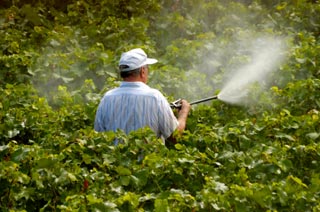Washington Post Gives Pesticide Industry a Clean Bill of Health

Remember The Godfather
This is becoming a pattern for WashPost, the newspaper to which I subscribe as an inside-the-Beltway resident: one Health section article after another downplays organic food, or the impact of antibiotics, or vegetarian eating. Today the running score is boosted in an article titled “Is organic really healthier?“: Corporate products umpteen, health concerns zero. (Note that the article is titled differently online from the Prince George’s County edition–usage corrected, claim modulated.)
To be sure, the Post Food section runs plenty of reduced-fat recipes and evinces other attention to lowering calories; health concerns are not ignored in culinary articles. However, when the dividing line is between you and the corporate interest–rather than between you and fat–the other side gets the greener turf. Today’s Health section front-pager opens, “Organic or conventional?”–i.e. which to buy? It then runs through a broad list of several major foods–excluding sweets and desserts–and concludes that there is little if any qualitative difference between organic and conventional milk, meats, produce, and eggs, and that there are insufficient data to draw conclusions about fish.

Dead as mackerel
Concerns mooted and downplayed, for the foods discussed, include pesticides, antibiotics, and hormones. Canning processes, bottling processes, frozen goods, slaughtering, warehousing, packaging, shipping, and breeding are either not discussed or are not analyzed in detail. No insect eggs or rodent hair here. Hey, those are protein. What happens inside vending machines, refrigerator trucks, conveyor lines, goes unrepresented. No discussion of BPA, estrogenic chemicals, cleaning fluids. Also no discussion of molds, mildew, mouse droppings.

The salmonella who came in from the cold
For the record, the article also does not mention herbicides. The Post over-all does sometimes throw some vocabulary in the direction of herbicides as a concern, if briefly–here and here and here, for example. The business press also mentions herbicides from time to time, but in more capitalist-running-dog fashion–like here and here.
The late Stanley Kubrick would have appreciated our learning to be philosophical about foreign substances in the food chain; it’s the dernier cri in tough-mindedness. How I Learned to Stop Worrying and Love Pesticides. The late Joseph Heller would have appreciated how creating a chemical-proof plant, or a chemical-resistant plant, would be hailed as a breakthrough.
Somehow the whole trend line reminds me of a decades-old but great cartoon about ‘holes in the ozone layer’. There was a time, if you remember, when many people worried about the ozone layer. The running gag about a woman with your stereotypical Eighties-style big hair was that she used so much hairspray she deserved to have a hole in the ozone layer named after her.
Some of this damage to Earth’s atmosphere was attributed, at the time, to use of aerosol sprays–regardless of the product; not just hairspray. So one cartoonist encapsulated our love of science, our hope-springs-eternal faith in progress as a means to undo the damage of past progress, and our miracle-in-a-can mindset: two men are pictured, one holding up an aerosol can, the other saying, “By George, I think you’ve got it.” The aerosol can is labeled, in big letters, OZONE.
Back then, it was a joke. Now it passes for science.
And that, children, is how research grants work.

Past threats
